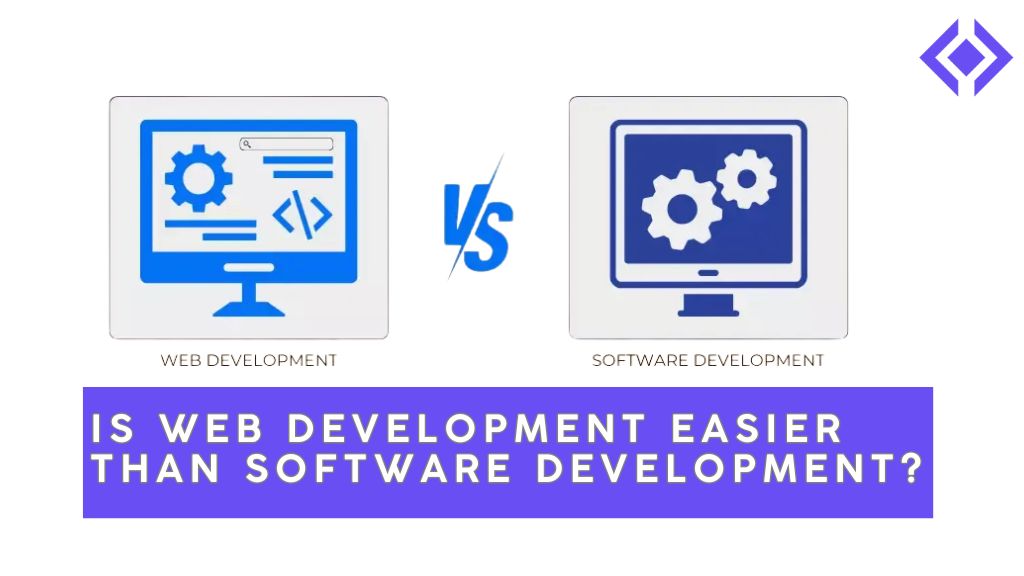Subtotal $0.00
If you’re exploring a career in technology, you might wonder: is web development easier than software development? Both fields offer exciting opportunities, but they differ significantly in scope, complexity, and skill requirements. In this blog, we’ll dive into the key differences between web development and software development to help you determine which path might be better suited for your interests and goals.
Understanding Web Development and Software Development
Before comparing the two, let’s define them:
Web Development
Web development focuses on creating, designing, and maintaining websites and web applications. It is typically divided into three main areas:
- Front-End Development: This involves the visible part of a website, including user interfaces, layouts, and interactive elements, built using HTML, CSS, and JavaScript.
- Back-End Development: This manages the server side, including databases, server logic, and APIs, often using languages like Python, PHP, or Ruby.
- Full-Stack Development: Full-stack developers handle both front-end and back-end tasks.
Software Development
Software development is broader and involves creating standalone applications, desktop programs, mobile apps, and system software. It covers:
- Application Development: Developing software for user tasks, like Microsoft Word or mobile apps.
- System Development: Working on operating systems or firmware.
- Embedded Systems: Creating software for devices like IoT gadgets or appliances.
How Do the Skills Compare?
The skills required for each field vary, influencing their perceived difficulty:
Web Development Skills
- Coding Languages: Familiarity with HTML, CSS, JavaScript, and frameworks like React or Angular.
- Design Principles: Understanding user experience (UX) and responsive design.
- Tools: Knowledge of version control (e.g., Git) and web development tools like VS Code and Figma.
- Problem-Solving: Debugging code and troubleshooting issues.
Software Development Skills
- Programming Languages: Proficiency in languages like Java, C++, Python, or Swift.
- Algorithms and Data Structures: Essential for solving complex problems and optimizing software.
- System Design: Creating efficient architectures for applications.
- Mathematics: Advanced math, such as calculus or linear algebra, may be needed for specialized fields like AI or graphics.
Complexity and Learning Curve
Web Development
Web development often has a gentler learning curve, making it appealing for beginners. Many aspects of web development, such as HTML and CSS, are relatively easy to learn. Frameworks like Bootstrap and libraries like jQuery further simplify tasks. However, mastering advanced JavaScript, responsive design, and back-end integration requires more effort.
Software Development
Software development can be more complex due to its broader scope. Developers often need to understand advanced programming concepts, system architectures, and optimization techniques. Fields like embedded systems or game development demand a deep understanding of hardware and software integration.
Career Opportunities
Web Development
- Pros:
- High demand for front-end, back-end, and full-stack developers.
- Opportunities to work on diverse projects, from small business websites to large-scale web applications.
- Freelance and remote work options are widely available.
- Cons:
- Market saturation in entry-level roles.
- Rapidly changing tools and technologies require continuous learning.
Software Development
- Pros:
- High demand for skilled developers in specialized fields like AI, machine learning, and cybersecurity.
- Often higher salaries for advanced roles.
- Opportunities to work on impactful, large-scale projects.
- Cons:
- Steeper learning curve.
- Requires a deeper understanding of programming and computer science fundamentals.
Practical Applications
Web Development
- E-Commerce: Building online stores with platforms like Shopify or custom solutions.
- Content Management Systems: Creating and managing websites using WordPress or Drupal.
- Web Applications: Developing tools like online calculators or collaborative platforms.
Software Development
- Mobile Apps: Creating apps for Android and iOS.
- Game Development: Designing video games for consoles, PCs, or mobile devices.
- Enterprise Software: Developing tools for businesses, such as CRM systems or accounting software.
Which Is Easier?
The answer depends on your interests, goals, and learning preferences:
- Web Development:
- Easier for beginners to get started.
- Requires less theoretical knowledge initially.
- Ideal for those who enjoy creative, design-focused work.
- Software Development:
- Demands a stronger foundation in programming and computer science.
- Offers diverse and advanced career paths.
- Suited for problem-solvers and those interested in technical challenges.
Tips for Choosing the Right Path
- Assess Your Interests: Do you enjoy visual design and user experience? Or are you fascinated by problem-solving and algorithms?
- Start Small: Experiment with beginner-friendly courses in both fields to see what resonates.
- Consider Career Goals: Research job opportunities and growth potential in your preferred area.
- Leverage Free Resources: Platforms like freeCodeCamp and Codecademy offer excellent introductory courses.
- Join Communities: Engage with web or software development communities to learn from professionals and gain insights.
Conclusion
Web development and software development each have their own challenges and rewards. Web development might be easier to start with, but software development offers a broader range of opportunities for those willing to tackle its complexity. Ultimately, the best choice is the one that aligns with your passions and career aspirations.
Call-to-Action: Ready to begin your journey? Explore free tutorials online and start building your skills today. Let us know which path excites you most in the comments below!

